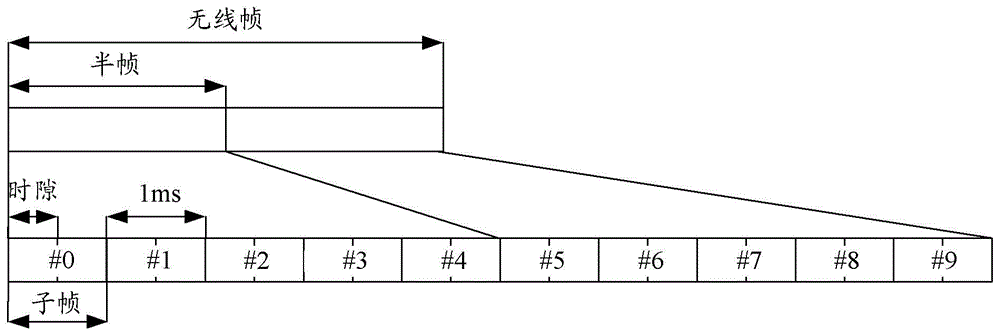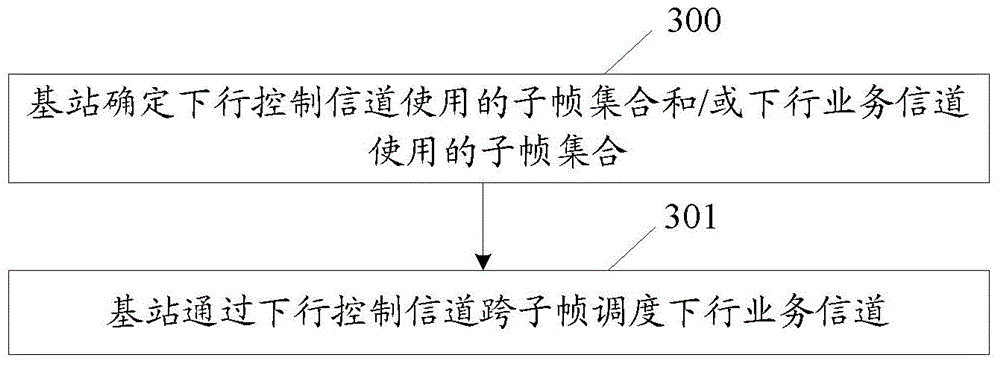Method and base station for realizing channel transmission
A channel transmission and base station technology, applied in the field of channel transmission, can solve the problems affecting the system work quality, affecting the normal communication system work quality and occupancy of MTC terminals
- Summary
- Abstract
- Description
- Claims
- Application Information
AI Technical Summary
Problems solved by technology
Method used
Image
Examples
Embodiment 1
[0369] In this embodiment, the ePDCCH is used as the downlink control channel, and the PDSCH is used as the downlink service channel for description:
[0370] There are three types of subframe sets used by the base station to send the ePDCCH: the first type, the MBSFN subframe; the second type, the subframe set configured through high-layer signaling; the third type, all available subframes.
[0371] Corresponding to the subframe set used by the terminal to receive and detect the ePDCCH, there are three cases. The first is to detect the MBSFN subframe; the second is to detect the subframe set configured by high-level signaling; the third is to detect in all available subframes.
[0372] On the base station side, the ePDCCH schedules the PDSCH through cross-subframes; where the cross-subframe scheduling interval is k, specifically, the time of the subframe used to send the ePDCCH is n, and the time of the subframe used to send the PDSCH is n+k.
[0373] The base station indicat...
Embodiment 2
[0382] In this embodiment, the ePDCCH is used as the downlink control channel, and the PDSCH is used as the downlink service channel for description, mainly describing the situation of cross-subframe scheduling of repeated transmission when the coverage is enhanced.
[0383] There are three types of subframe sets used by the base station to send the repeatedly transmitted ePDCCH, the first type is non-MBSFN subframes; the second type is the subframe set configured through high-layer signaling; the third type is all available subframes. There are three types of subframes for detecting ePDCCH when the corresponding terminal receives: the first type, receiving and detecting in non-MBSFN subframes; the second type, receiving and detecting in the subframe set configured by high-level signaling; the third type, receiving and detecting in all subframes Receive detection. If there is an intersection between the subframe set in the subframe set configured by high-level signaling and th...
Embodiment 3
[0395] This embodiment describes in detail the transmission of downlink control channels and downlink traffic channels using the method provided by the present invention.
[0396] The base station first sends an MTC-specific system indication message for the MTC UE, and notifies the MTC terminal of the MBSFN subframe set in the cell and the subframe set for actually transmitting the PMCH channel through the system indication message.
[0397] When the MTC UE transmits downlink service information, since the MTC UE can only receive one narrowband resource in the same subframe and the downlink control channel occupies an independent narrowband resource, the base station schedules the PDSCH of the low-cost MTC UE across subframes through the ePDCCH. Service information is carried on the PDSCH.
[0398] At this time, because the cross-subframe scheduling interval k is a predefined fixed value; if k=1, the terminal blindly detects and receives the ePDCCH on the narrowband resource ...
PUM
 Login to View More
Login to View More Abstract
Description
Claims
Application Information
 Login to View More
Login to View More - R&D
- Intellectual Property
- Life Sciences
- Materials
- Tech Scout
- Unparalleled Data Quality
- Higher Quality Content
- 60% Fewer Hallucinations
Browse by: Latest US Patents, China's latest patents, Technical Efficacy Thesaurus, Application Domain, Technology Topic, Popular Technical Reports.
© 2025 PatSnap. All rights reserved.Legal|Privacy policy|Modern Slavery Act Transparency Statement|Sitemap|About US| Contact US: help@patsnap.com



